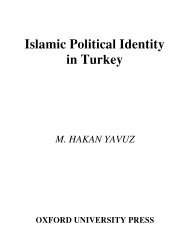You also want an ePaper? Increase the reach of your titles
YUMPU automatically turns print PDFs into web optimized ePapers that Google loves.
MANAGING POLITICS AND ISLAM IN INDONESIA 29IDEOLOGICAL AND STRUCTURALUNDERPINNINGS OF CORPORATISM IN INDONESIAThe State Philosophy of PancasilaBourchier illustrates how European-derived corporatist thought found its way to<strong>Indonesia</strong>. Mostly European-tra<strong>in</strong>ed <strong>Indonesia</strong>n law scholars adapted majorstr<strong>and</strong>s of corporatist thought to local circumstances. Corporatist values of‘organic-statism’ were written <strong>in</strong>to <strong>Indonesia</strong>’s Constitution of 1945 <strong>and</strong> foundstrong expression <strong>in</strong> the state philosophy of Pancasila (five pr<strong>in</strong>ciples). NewOrder strategists turned Pancasila <strong>in</strong>to an ‘ideological’ project for theconta<strong>in</strong>ment <strong>and</strong> exclusion of alternative ideologies deemed as threaten<strong>in</strong>g to thepolitical fabric <strong>and</strong> stability of the nation. Communism, <strong>Islam</strong>ic ideology, <strong>and</strong>liberalism were identified as antithetical to a collectivist ideal of organicstatismas conta<strong>in</strong>ed <strong>in</strong> Pancasila, which was to provide a s<strong>in</strong>gle political culture tounderwrite the new corporatist arrangements. Dur<strong>in</strong>g the 1970s, state leaders<strong>in</strong>troduced Pancasila Moral Education (PMP) <strong>and</strong> Guidel<strong>in</strong>es for theComprehension <strong>and</strong> Implementation of Pancasila (P4) <strong>in</strong>doctr<strong>in</strong>ation courses.Through these courses, the state leadership sought to <strong>in</strong>still <strong>in</strong> military personnel,civil servants, teachers, students <strong>and</strong> broader society the ma<strong>in</strong> values conta<strong>in</strong>ed <strong>in</strong>the official political culture. The courses emphasised a so-called ‘<strong>in</strong>tegralist’conception of state-societal relations that placed great emphasis on the familyunit as the nucleus of paternalistically guided, hierarchically ‘ordered’ <strong>and</strong>‘harmonious’ society. Like Stephn’s ‘organic-statism’, <strong>in</strong>tegralism was aconception of state <strong>and</strong> society constitut<strong>in</strong>g an organic unity with the state hav<strong>in</strong>ga strong role <strong>in</strong> establish<strong>in</strong>g social order. The courses <strong>and</strong> ‘<strong>in</strong>tegralism’ stressed<strong>in</strong>ter-connect<strong>in</strong>g duties <strong>and</strong> obligations of citizens to their immediate family,which tied <strong>Indonesia</strong>ns <strong>in</strong> ever-wider concentric circles of allegiance <strong>and</strong> loyaltyto the state, itself conceived as the larger family. The ‘<strong>in</strong>tegralistic’ conception ofthe state became an underly<strong>in</strong>g functional logic of Golkar, <strong>and</strong> ‘the whole idea ofthe collectivity of the nation’ was ‘expressed through functional groups’ of the‘Big Golkar Family’. 28 These values were also a central part of European, Lat<strong>in</strong>American, <strong>and</strong> East Asian corporatist thought.In <strong>Indonesia</strong>, the state <strong>and</strong> society conceived as a family meant that there waslittle room for dissent. Dissent was seen, at best, as an act of disobedience of anaughty child deserv<strong>in</strong>g of punishment <strong>and</strong> scorn. At worst, dissent was viewedas subversion that required heavy stricture <strong>and</strong> removal from the family(imprisonment or worse). These organicist values were used as an <strong>in</strong>strument ofideological persuasion. 29 In the mid-1980s, the state m<strong>and</strong>ated Pancasila as thesole ideological foundation of all organisational life <strong>in</strong> <strong>Indonesia</strong>, effectivelyprohibit<strong>in</strong>g organisations from adher<strong>in</strong>g to alternative ideologies <strong>in</strong> their partyplatforms <strong>and</strong> programs. Pancasila Industrial Relations (HIP) codified the idealof harmonious relations between state, employer, <strong>and</strong> worker conceived as amutually beneficial partnership <strong>in</strong> which all parties sought <strong>in</strong>dustrial peace <strong>and</strong>




